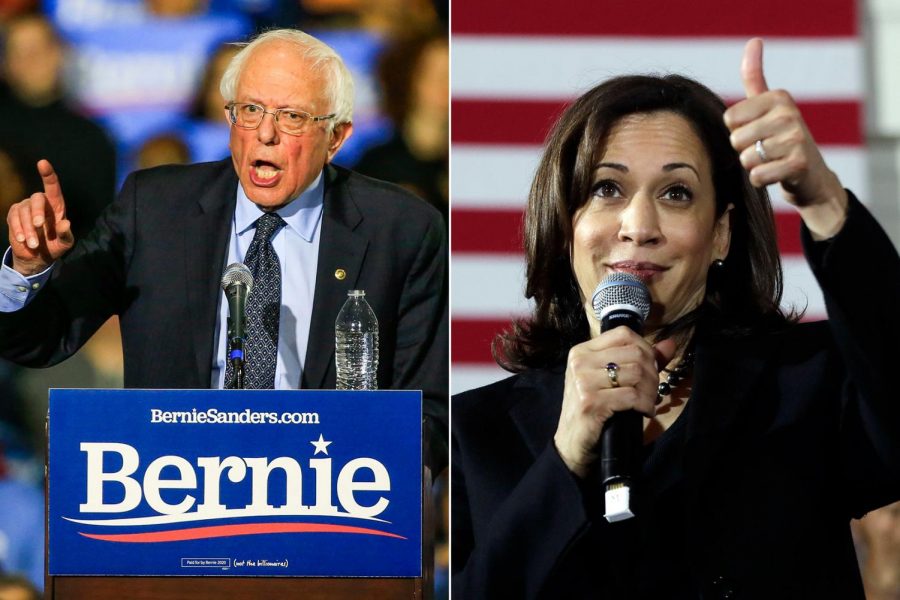An Quick Look at the Crowded Field of Announced Candidates for the Democratic Presidential Nomination
Bernie Sanders (left) and Kamala Harris are the current front runners in a way-too-early assessment of the field of candidates for the 2020 Democratic Party’s presidential nomination.
The stakes are higher than ever in the 2020 presidential race as Democrats seek to prevent a second term of the Trump presidency. There are already eighteen Democrats who have officially declared that they are running for president. However, as an ever-increasing amount of hopeful Democrats are announcing their candidacy, some people are raising concerns that such a crowded field will be counterproductive by dividing Democratic voters and thus help Trump’s reelection. It is also becoming difficult for citizens to keep an oversight of who is who. So, here is an overview of all the Democratic candidates so far, ranked in order of likelihood at winning the nomination as according to Rolling Stone magazine.
1. Bernie Sanders (77)
The Vermont senator is a self-described democratic socialist. Sanders was the runner-up in the 2016 Democratic primary, and he has since maintained a passionate group of supporters and a successful grassroots campaign. His signature stances are “Medicare for all” and free college tuition. He has demanded a $15 minimum wage and recently introduced the “For the 99.8% Act,” which would drastically increase the estate tax. Many of his ideas were once viewed as far-left but have now become popular and mainstream. He has faced several controversies, such as with his 2016 campaign where female staffers alleged that they were sexually harassed by male staffers.
2. Kamala Harris (54)
Harris, born to Jamaican and Indian parents, is a senator from California and the former attorney general of California. She advocates a liberal civil rights agenda and middle-class tax cut legislation. Supporting the Green New Deal and marijuana legalization, she has also proposed a LIFT Act that would pay out up to $500 a month for working-class families. This would be paid for by ending Trump’s “giveaways to big corporations and the top one percent.” She has been noted for her tough questioning of Trump’s cabinet nominees and Supreme Court nominee Brett Kavanaugh. However, she has been criticized by some for her criminal justice record and decisions made as attorney general.
3. Elizabeth Warren (69)
This Massachusetts senator and former Harvard professor received much media attention over her supposed Native American heritage. After taking a DNA test in hopes of proving Native ancestry, Warren apologized for “furthering confusion on tribal sovereignty and tribal citizenship.” Her signature issues are income inequality, big corporations, and political corruption. She has pledged not to accept campaign donations from the oil, gas, and coal industries. She launched the Consumer Financial Protection Bureau and revealed a plan to use antitrust laws to break up Big Tech. She hopes to use a wealth tax to pay for benefits such as universal free or low-cost childcare.
4. Beto O’Rourke (46)
This former congressman from Texas narrowly lost the 2018 bid for his state’s Senate seat to Ted Cruz. Popular on social media and among younger Democrats, he has a great viral appeal and has gained most of his funding from small-dollar donations. He delivers a message of national unity, and his liberalism has found success in the deep red state of Texas. Some issues he focuses on are immigration reform, marijuana legalization, and rural hospital access.
5. Pete Buttigieg (37)
Buttigieg is a military veteran and the mayor of South Bend, Indiana. As both a very religious and openly gay man, “Mayor Pete” could be the face of the Christian left. He advocates policies on climate change and supports the economic opportunities presented in the Green New Deal. He supports comprehensive background checks and opposes guns in schools and permitless carrying. He has said that he supports “Medicare for all who want it” and has spoken about the need for a federal Equality Act to eliminate discrimination based on sexual orientation or gender identity.
6. Cory Booker (49)
Booker is a New Jersey senator and a leader for criminal justice reform. In 2017, he introduced legislation that would have legalized marijuana and erased federal marijuana convictions from criminal records. He has one of the most liberal voting records in the Senate, but he also faces criticism for having connections to Wall Street, voting against a measure that would have greatly reduced drug prices, and supporting charter schools. He supports the Medicare for All Act and now says he stands behind Sanders’s bill to decrease prescription drug costs. He hopes to target the wealth gap by creating “American Opportunity Accounts” so children from poor families can enter adulthood with up to $46,000 to invest.
7. Amy Klobuchar (58)
As the first female senator from Minnesota, she is admired by many for her stern questioning of Brett Kavanaugh during his confirmation hearings. She champions legislation to combat the opioid crisis, drug addiction, and the soaring cost of prescription drugs. She emphasizes her record of making laws to reduce the backlog of rape kits, and while she has not signed onto Medicare for All, she does support universal health care. It has been alleged that she mistreated and demeaned her staff, such as by throwing a binder at a staffer. She responded by saying that she may push employees “too hard,” but only because she holds people to high standards.
8. Andrew Yang (44)
Yang is a tech executive from New York with Taiwanese parents. He founded an economic development nonprofit to revitalize urban areas by training entrepreneurs. He is best known for proposing a universal basic income of $1,000 per month for all Americans in order to counteract the effects of automation in the workforce. His campaign has become a viral hit, with his supporters sharing memes and referring to themselves as the #YangGang.
9. Julián Castro (44)
The only current Latino candidate, Castro was the housing secretary for the Obama administration and is the former mayor of San Antonio. His platform consists of universal pre-K, “Medicare for all,” higher minimum wage, and immigration reform. He wants to create a path to citizenship for undocumented immigrants and treat entering the U.S. as a civil violation rather than a criminal one. He says his first executive order would be to rejoin the Paris Climate Agreement. His first campaign trip was to Puerto Rico, and he vows to visit all 50 states during the primaries.
10. Kirsten Gillibrand (52)
This senator from New York used to be a conservative congresswoman with an anti-immigrant past but has now transformed herself into one of the Senate’s leading liberal voices. Her agenda focuses on women’s equality and opportunity, and she has been a champion of the #MeToo movement. The self-described “young mom” has sworn off funding from corporate PACs (political action committees) but is still backed by Wall Street.
11. Jay Inslee (68)
The former congressman and current governor of Washington State is best known for his environmental policies. He is one of the most vocal climate advocates, calling on Democrats to create jobs in renewable energy. He launched the U.S. Climate Alliance, a bipartisan group of 22 governors who chose to continue following the Paris Climate Agreement. He slashed college tuition in his state and began an initiative to grant pardons for misdemeanor marijuana offenses.
12. Tulsi Gabbard (38)
This congresswoman from Hawaii is an Iraq war veteran and has a controversial history of anti-gay statements. She also received backlash for meeting with Syrian president Bashar al-Assad, whose regime is accused of using chemical weapons against civilians and for dismissing his opposition as terrorists. She is the first Samoan-American and the first Hindu member of Congress, and she aims to legalize marijuana and opposes American military intervention overseas.
13. John Hickenlooper (67)
The former governor of Colorado and former mayor of Denver is a political moderate with a record of success in a purple state. He was able to build consensus around expanding Medicaid, gay rights, and gun control. His state government passed background checks and magazine capacity limits after the Aurora shooting.
14. John Delaney (56)
This former Maryland congressman and former businessman has been campaigning aggressively since 2017. He claims to be a bipartisan problem-solver and favors universal health care but not “Medicare for all.” At one point he was the youngest CEO on the New York Stock Exchange, and his top priority is investing in infrastructure. He wrote a letter to Trump urging him to raise the corporate tax rate from 21 to 23 percent in order to fund $200 billion of infrastructure projects. As a congressman, he cosponsored the DREAM Act in 2017 and now supports a path to citizenship for undocumented immigrants as well as increased border security.
15. Eric Swalwell (38)
Swalwell is a congressman from California and a member of the House Judiciary and Intelligence Committees, emphasizing his experience in investigating the Trump administration. His campaign centers on gun control and fighting the NRA. He is the only candidate demanding a mandatory national ban and buyback of military-style semiautomatic assault weapons.
16. Tim Ryan (45)
This Ohio congressman is focusing on bringing jobs to rural America. He wants to renegotiate trade deals and champions unions’ rights, casting himself as a voice for the blue-collar voters of the Midwest. Although he once opposed abortion rights, he has gradually reversed his position. He also gained some enemies in his party when he pledged to vote against Nancy Pelosi from becoming Speaker of the House back in 2018.
17. Wayne Messam (44)
Messam, the son of Jamaican immigrants, is a former college football champion and the first black mayor of Miramar, Florida. He has progressive stances on guns, immigration, and environmental issues and proposes canceling all student debt (over $1.5 trillion owed by 44 million Americans!). He also calls for statehood for Puerto Rico.
18. Marianne Williamson (66)
As a lecturer and author of self-help and spirituality books, Williamson’s chances at a successful presidential bid are fairly unlikely. Most notably, the Texan native has apologized for slavery and crimes perpetrated by white people against black people, proposing $100 billion in reparations for slavery that would be distributed annually over the course of a decade for economic and educational projects.










